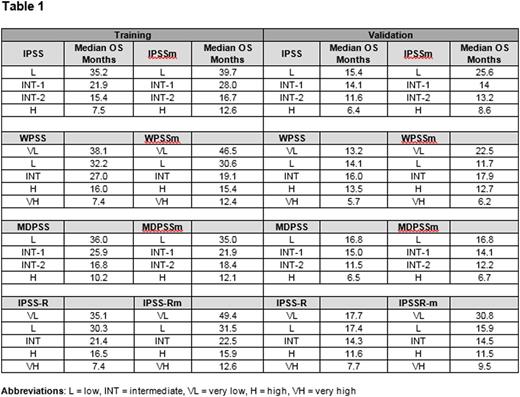Abstract

Background
Several prognostic models have been developed to risk stratify patients (pts) with MDS including: the International Prognostic Scoring System (IPSS), Revised IPSS (IPSS-R), World Health Organization classification-based Prognostic Scoring System (WPSS), and MD Anderson Prognostic Scoring System (MDPSS). All except for the MDPSS were developed in treatment-naive pts and, if validated in treated pts, were done so primarily in those receiving one line of therapy. Incorporation of molecular data into the IPSS-R improves its predictive power, and adding molecular data to the IPSS can upstage or downstage some pts. In this study, we compared the prognostic utility of each prognostic model, after adding molecular data, in treated MDS pts.
Method
Clinical and mutational data from MDS pts diagnosed between 1/2000-1/2013 were analyzed. A panel of 60 gene mutations that were described as commonly mutated in myeloid malignancies was included. Patients who underwent hematopoietic cell transplant (HCT) were censored at the time of transplant. Univariable and multivariable analyses on the training cohort were performed by applying Cox proportional hazards regression analyses that included age, model score, and molecular mutations with an outcome of overall survival (OS). All molecular models were then applied to the validation cohort. The fit of the proposed models to the data was assessed by using Akaike's information criterion (AIC, lower values imply better fit) and concordance (c-) index.
Results
A total of 610 pts were included and divided into two cohorts, training (404 pts), and validation (206 pts). Median age of the training cohort was 67 years (range, 19-88); 83 pts (20%) had MDS/MPN including chronic myelomonocytic leukemia (CMML). Pts received a median of 2 lines of therapies (range, 0-7) and 15% of pts underwent HCT. First line therapies included: supportive care (22%), growth factors (22%), azacitidine +/- combinations (30%), decitabine +/- combinations (6%), lenalidomide (5%), induction chemotherapy (3%), immunosuppressive therapy (3%), and other therapies /clinical trials (9%). The median OS in the training and validation cohorts per scoring system (SS), i.e. IPSS, WPSS, MDPSS, and IPSS-R, is summarized in Table 1. The most common mutations in the training cohort were: TET2 (19%), ASXL1 (16%), SF3B1 (13%), DNMT3A (9%), STAG2 (9%), RUNX1 (8%), and U2AF1 (7%). In univariate analyses, mutations in EZH2 (HR1.8, p = .02), TP53 (HR2.3, p < .001), RUNX1 (HR 1.5, p = .05), and NPM1 (HR1.49, p = .001) had a negative impact on OS while SF3B1 (HR .34, p < .001) mutations were associated with favorable outcome. In multivariate analyses that included SS, mutations (from the list above), and age (except for the MDPSS, which already includes age), the following independent prognostic factors for OS were identified: age, EZH2, SF3B1, TP53, and each SS. Based on the fitted coefficients of each prognostic factor, a molecular version of each model including IPSSm, WPSSm, MDPSSm, and IPSS-Rm was proposed with median OS in the training and validation cohorts as summarized in Table 1. The addition of molecular data improved (reduced) the AIC and (raised) the C-index for the IPSS (2332.6, .69 vs. 2365.8, .64), WPSS (2322.3, .68 vs. 2356.2, .65), MDPSS (2308.4, .71 vs. 2323.4, .69), and IPSS-R (2305.2, .70 vs. 2330.5, .66), respectively. Further, the addition of molecular data to the IPSS upstaged 37% of pts from lower- to higher-risk disease and downstaged 5% of intermediate-1 to low risk disease. In the WPSS, it upstaged 21% of pts and downstaged 24%; in the MDPSS it upstaged 19% and dowstaged 22% of pts from intermediate-1 to low risk; and in the IPSS-R it upstaged 26% to higher-risk disease and 59% of pts with intermediate risk to a higher risk category.
Conclusions
The addition of molecular data to established MDS prognostic models can improve their predictive power, even in treated MDS patients. More importantly, adding molecular information can upstage or downstage pts into different risk categories. This study highlights the importance of incorporating molecular data into clinical prognostic systems.
Mukherjee:Celgene: Consultancy, Honoraria, Research Funding; Novartis: Consultancy, Honoraria, Research Funding; Ariad: Consultancy, Honoraria, Research Funding.
Author notes
Asterisk with author names denotes non-ASH members.

This icon denotes a clinically relevant abstract


This feature is available to Subscribers Only
Sign In or Create an Account Close Modal